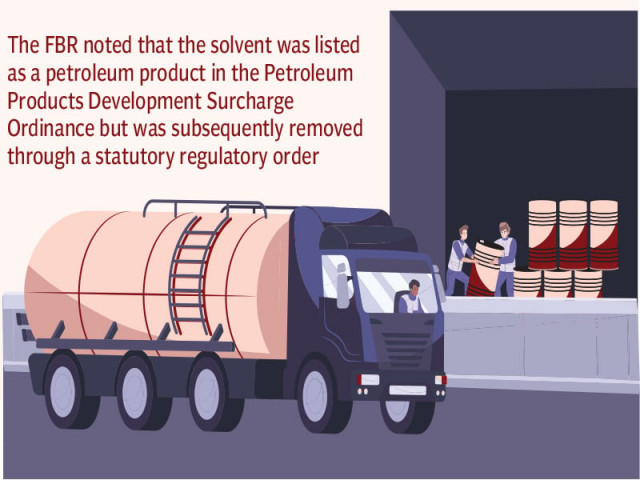Probe into Rs135b fuel scam begins
Govt sets up committee to investigate illegal import, sale of hazardous fuel

Amid an attempt to release over 800 tankers carrying highly inflammatory petrol adulterant, the government has constituted a fact-finding committee to investigate the Rs135 billion scam related to the import of dangerous petrol as an industrial chemical.
The committee has been given one week to finalise its recommendations and assign responsibility for the illegal import, according to a notification. This seven-member fact finding committee was constituted only after intervention from the prime minister's office.
The committee will investigate the illegal import, clearance, and sale of Light Aliphatic Hydrocarbon Solventa hazardous petroleum productin violation of the Petroleum Act 1969 and the Petroleum Rules 1937, according to the notification, issued by the Petroleum Division three days ago. The committee will be chaired by Additional Secretary Petroleum Hasan Mehmood Yousufzai and its members include representatives from the Hydrocarbon Development Institute of Pakistan, Engineering Development Board, and Pakistan Customs.
The committee has been tasked with uncovering the facts of the scam, providing recommendations, and determining responsibility within seven days, showed the notification. It has already held a couple of meetings.
The Express Tribune reported on Sunday that the government has uncovered a massive Rs135 billion scam involving the import of a highly inflammable and dangerous petrol adulterant, marketed as high-quality petrol. This solvent, mixed with petrol, has caused significant damage to car engines and resulted in financial losses for both consumers and the national treasury.
Customs Intelligence initially discovered the scandal in May, but it remained hidden in official files until July 29, when the prime minister's office intervened and ordered an immediate halt to the illegal activities.
As a result of the July 29 order, about 807 tankers carrying the inflammable fuel are now stuck at the Dry Port. Of the 807 tankers, 160 are Iranian tankers also stuck at the port, according to the Federal Board of Revenue (FBR). The importers, operating through the Taftan-NLC Dry Terminal, were bringing in the Light Aliphatic Hydrocarbon Solvent and selling it as petrol with the alleged complicity of customs officials and laboratory personnel, according to official documents.
On Tuesday, the FBR's member Customs Operations told the Senate Standing Committee on Finance that the law requires an import license for the solvent, a requirement that was not met until Customs Intelligence exposed the issue and the prime minister's office intervened.
The government is under pressure to release the stuck cargo in relaxation of legal requirements. The outgoing FBR Chairman Malik Amjad Zubair Tiwana informed the standing committee that the issue had been referred to a three-member ministerial committee through the commerce ministry.
The FBR wrote to the secretary commerce on Monday, stating that, as a petroleum product, the solvent cannot be imported without a license for import and storage. This stance is also supported by the petroleum division. The FBR had previously allowed imports based on the premise that the Import Policy Order of 2022 did not explicitly restrict or prohibit the solvent.
The FBR noted that the solvent was listed as a petroleum product in the Petroleum Products Development Surcharge Ordinance of 1961 but was subsequently removed through a statutory regulatory order.
Currently, the clearance of the solvent is halted, and the 807 tankers are stuck at the NLC Dry Port Quetta. The Quetta Chamber of Commerce and Industry has requested provisional clearance of the pending consignments, as licensing can take up to three months. However, the FBR has refused to clear the tankers based on undertakings and has sought a one-time waiver from a ministerial committee.
The commerce ministry, however, has declined to support the clearance. "The Light Aliphatic Hydrocarbon Solvent is not covered under the Import Policy Order, and therefore does not qualify for consideration of a one-time waiver," the commerce ministry informed the FBR.
The ministry suggested that if the FBR considers it appropriate, the matter could be referred to the Ministry of Energy for a decision based on relevant rules. Alternatively, legal opinion from the Law Division could be sought regarding the future course of action.
There is also a perspective that existing importers should receive a one-time benefit, potentially allowing their 807 tankers, while future imports should adhere to new licensing requirements.
Over two years ago, imports of this solvent were only 28,000 metric tonnes, but this number surged to 385 million tonnes during the July-May period of the last fiscal year. According to Customs Intelligence, approximately 900 million litres of adulterant were imported in under three years, resulting in losses amounting to Rs135 billion.



















COMMENTS
Comments are moderated and generally will be posted if they are on-topic and not abusive.
For more information, please see our Comments FAQ